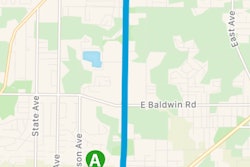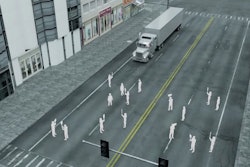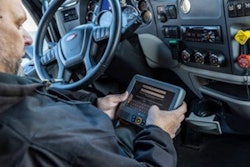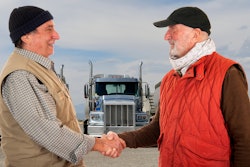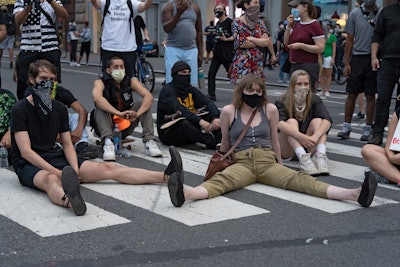 Protesters block traffic on the fourth straight day of protests against the death of George Floyd by a Minneapolis police officer during COVID-19 pandemic May 30, 2020.
Protesters block traffic on the fourth straight day of protests against the death of George Floyd by a Minneapolis police officer during COVID-19 pandemic May 30, 2020.
When social unrest spills out onto the highway, truckers are put in a precarious position: wait out an ocean of protesters or, if it turns violent, force an 80,000 pound rig through the mass and out of harm's way.
The latter comes with potentially serious legal ramifications, leading some carriers to think the law favors those who have no business trying to stop traffic with their bodies and picket signs.
Peninsula Truck Lines has seen plenty on the roads and highways in the Northwest since 1951 and when it comes to violent protestors heading out onto the region’s roads and highways they think demonstrators are getting a pass.
“I would say very much so,” said Peninsula Truck Lines President Brent Vander Pol.
Sheri Call, executive vice president of Washington Trucking Associations, said more could be done to protect drivers, especially when they're outnumbered some times several hundred to one.
“Our concern is with drivers first, the safety of the general public, and continuing to make timely deliveries." Sheri Call, executive vice president of Washington Trucking Associations
“Our concern is with drivers first, the safety of the general public, and continuing to make timely deliveries,” Call said. “Many days it has felt like illegal acts are going unpunished, and taking over the interstates in areas has been accommodated. Regardless, trucking companies cannot afford to risk driver safety and must mitigate risks wherever, whenever possible.”
Vander Pol believes that protest-led efforts to defund the police in the region have led to further property destruction and commerce disruption at the hands of protestors.
Calls to “defund the police,” and protests stemming from that, ramped up last summer in the wake of several highly covered deaths and shootings of suspects in encounters with police officers. Generally, organized advocates of “defund the police” proposals at city and state levels call for cutting police funding and shifting funds to other areas of city and state budgets. Cutting police budgets can result in the reduction of police forces which critics say can result in higher crime rates.
“Unfortunately, in the city of Seattle they’re trying to do what they can to defund the police department and along with that comes reduced officer presence on the streets,” Vander Pol said. “They are absolutely giving preferential or deference to protestors even if they become violent or if property damage occurs. They are pretty much hands off. As disappointing as it is that’s just the way it works.”
Vander Pol is not alone. Mayor Stan Pulliam of Sandy, Oregon, said the ongoing movement to defund the police in Portland has impacted businesses and lives. In a Fox News segment this week, he called the protests a "culture of criminality."
“It really is starting to look like a completely different city than the one I know and love," he said.
“Everyone’s safety is important to law enforcement.”
While neither city or law enforcement officials in Portland or Seattle would respond to interview requests, state troopers in both states did.
Washington State Patrol said the ongoing push to defund the police "has had no material impact on WSP or our ability to respond" to protect all parties concerned, which includes drivers and protesters, and the agency pushed back at the notion that protesters receive preferred treatment.
“This is simply not true,” WSP Communications Director Chris Loftus said of a perceived imbalance of justice. “Our role is to ensure the safety of all individuals to the best of our abilities. In the middle of civil unrest, our Troopers must first and foremost protect lives. Of all our responsibilities, that is the single most important. Be it the lives of those innocently traveling near or through an incident, or those homes and businesses that might neighbor instances of violence, the lives of those involved in the civil unrest themselves, or the lives of those who have come to watch or record the events, our Troopers and their partners in local law enforcement, as both individuals and teams, must make split second decisions on the best course of action to protect life in any given moment.”
When told that some believe that protestors are getting preferential treatment, Oregon State Police spokesperson Capt. Timothy Fox said in a statement, “Everyone’s safety is important to law enforcement.”
Regarding protestors rights Loftus said there are limits that must be kept in check.
“We are absolutely committed to protecting the right of peaceful protestors to speak and assemble,” Loftus stated. “But those rights, while enshrined in our Constitution and held sacred in our hearts, are not boundless. The boundary of free speech and free assembly is illegal and unsafe behavior. Dangerous and threatening behavior is illegal and will meet the firm resolve of WSP and other law enforcement. Simply put, our highways are not the place for speech or protest. They are the routes of safe and regulated transport. Any other unregulated activity is dangerous and illegal.”
A new normal?
Peninsula Trucking, an LTL regional carrier operating roughly 350 trucks, hasn’t been impacted “very much” by protests, Vander Pol said. Most of their routes do not go into areas where demonstrators typically gather.
Areas where protests usually take place have businesses and restaurants that have remained closed during the COVID pandemic.
“The majority of freight we handle doesn’t go into those specific areas where you would have a tendency to see those protests,” Vander Pol said. “At least currently, there’s not a lot going on in the world as far as retail goes at the store level. Restaurants are closed. You’re not seeing the level of truck traffic that you would normally see outside of COVID. It has impacted us but it hasn’t impacted us very much.”
Interstate traffic jams have occurred when protestors have marched out onto the highway, Vander Pol said.
“When they spill out onto the interstate then it does cause problems but those problems don’t last for hours and hours,” he said. “Generally speaking law enforcement is pretty good about getting those cleaned up relatively quickly.”
Vander Pol said he appreciates the efforts of city and state police officers working on the frontlines to address protestors who have crossed the line of free expression into destructive, dangerous and illegal behavior. Interstate protests, where state officers have jurisdiction, can prove particularly challenging. On Jan. 18, WSP arrested a dozen protestors who had marched out onto Interstate 5 in Seattle.
“I think the state patrol gets put in a difficult situation as well,” Vander Pol said. “Trying hard to open the interstate without getting anyone hurt or infringing on their right to protest.”
Protesting has become a new normal in the Northwest that requires Peninsula Truck Lines to stay in tune with local news reports and social media posts in order to avoid areas where protests are occurring. It can prove frustrating for Vander Pol and others who say law enforcement leaders are under pressure to look the other way.
“I would say it’s become relatively routine at least here on the West Coast where the powers that be – the lawmakers and the law enforcers – are just taking a hands-off approach,” he said.
In case drivers come across protestors, Vander Pol said they're expected to stop, shut down their truck and leave their truck if necessary.
"If there is any indication that you are in personal danger, leave the truck," Vander Pol said. "Get out and go. Don’t try and be a hero and save the vehicle or save the freight. Get out, leave the area. If the truck’s still there when it’s all over with, great. If it’s not, we’ll deal with it."
Loftus said that there are times when a truck may prove to be a safe haven and other times when it's best to leave.
"Do not assume that protestors will get out of your way if you honk your horn or make aggressive driving movements to get them to move. Do not become part of the story. When confronted with the possibility of unknown danger, make a determination as quickly as you are able and get out of the area as soon as you can. Call 911 to report the incident and ask for help. If your vehicle provides your best protection, lock the doors and stay in it. If windows are being broken or fire has been started and it is not safe to stay in the vehicle, abandon the vehicle, do not confront the protestors, and get away from the unrest as quickly as possible. Human life – your life – is more important than any property or any schedule."


